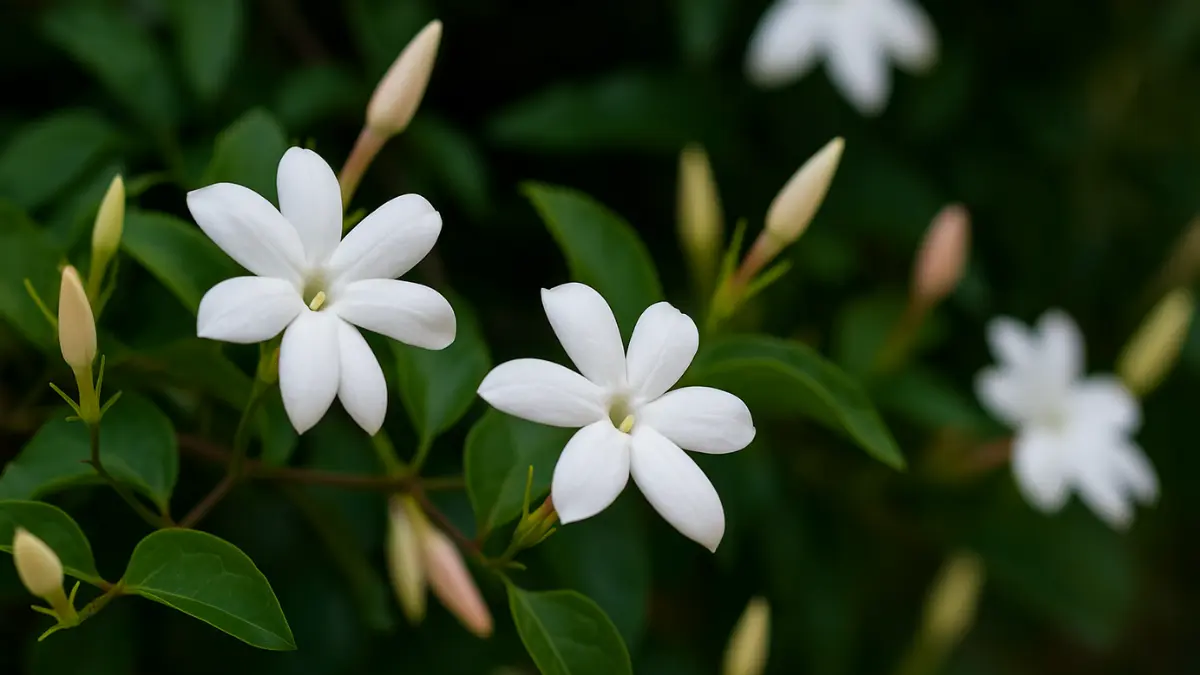When we list fragrant flowering plants, jasmine will always be at the top of the list, and almost every gardening enthusiast has these fragrant beauties in their garden. However, to truly enjoy its essence, you need to know how to plant jasmine in the right way so that it can thrive effortlessly in your garden.
This concise yet impactful jasmine planting guide will help you in every possible way, whether you want to plant them in pots or the ground.
Let’s walk through all the secrets you need to know before you plant jasmine.
1. Choose The Right Variety
So, jasmine has around 200 varieties, and it’s not possible to cover them all in one blog post, so let’s see some trendy options.
| Jasmine Variety | Growth Type | Ideal Use | Fragrance Level | USDA Zones | Best For |
| Arabian Jasmine | Shrub / Small Vine | Containers, fences, small spaces | 🌸🌸🌸🌸🌸 | 9–11 | Indoor/outdoor, tropical gardens |
| Common Jasmine | Climbing Vine | Trellises, pergolas | 🌸🌸🌸🌸🌸 | 7–10 | Outdoor gardens, fences |
| Night-Blooming Jasmine | Tall Shrub / Vine | Privacy screens, patios | 🌸🌸🌸🌸 | 8–11 | Evening fragrance, warm regions |
| Jasmine Minima | Groundcover Vine | Slopes, edges, hanging baskets | 🌸🌸🌸 | 7–10 | Ground cover, spill-over look |
2. Ideal Sunlight Conditions
As all these varieties produce flowers in abundance, they require energy to do so; they require 6+ hours of daily sunlight.
If you don’t have that kind of space, when your jasmine plants can get high amounts of sunlight, they can manage themselves in partial shade, but you may see reduced bloom count.
Best Placement: If growing as an indoor plant – South-facing balcony, garden trellis, or windowsill.
3. Best Time To Plant Jasmine
Jasmine belongs to tropical and subtropical species; they will comfortably settle down in spring and early summer when the soil is comparatively warm compared to other seasons.
If you are going to grow them in containers, just protect your jasmine plant from frost and harsh cold weather, and they will act as a plant that can be planted all year round.
Still, I will recommend avoiding plating it in extreme heat or deep winter.
Read This – 6 Jasmine Flower Vine Plants Every Garden Needs In 2025
4. Soil Preparation & Potting Mix
I know many of you will move towards your AI chatbox for this, but until now, AIs haven’t planted any plants and grown them, so I apologize, but you have to stick here. Look at these 3 points and you will know more than enough for preparing a perfect soil mix.
- There’s no compulsory soil type to grow it, it’s not like a line of stone that you have to use any particular soil.
- But if you want to get better propagation results, it’s best to use sandy loam soil mixed with FYM ( Farm Yard Manure )
- Also, the soil pH value should be around 6.0 – 7.0
Read This – How To Grow Jasmine From Cuttings Without Rooting Hormone
5. Watering Tips
As I always say, only water your plant when you see the upper/top layer of the soil dry. Jasmine hates soggy soil as it can lead to root rot.
- Summer – 2-3 times/week
- Winter – Once in 7-10 days
6. Support, Trellis & Pruning
Not all jasmine varieties demand support. But for vining types, you need to arrange some kind of support, like an arch, trellis, or a fence, in their initial growing phase.
Read This – Does Jasmine Need A Trellis To Grow ?
Pruning them just after their flowering season will not only keep your plant in shape but also promote new growth.
Keep an eye out for dead and damaged foliage and remove it.
7. Fertilization Tips
In their initial phase, all the jasmine plants need to be fertilised with phosphorus-rich fertiliser for building a strong root system.
After maturing from spring to midsummer, fertilise them with a balanced liquid fertiliser every 2-4 weeks.
Common Problems & How to fix them
- Yellow leaves – Underwatering, overwatering, or poor drainage.
- No blooms – Either getting too much nitrogen or not getting enough sunlight.
- Pests – Pest attack can be very dangerous if the infestation gets out of hand. Aphids and mealybugs can be treated with neem oil or insecticidal soap in the beginning. Click here to read my detailed blog post on Jasmine plant pests and their treatment.
Conclusion
Planting jasmine the right way ensures a thriving, fragrant plant that lights up your garden or home. Follow these easy steps and enjoy a season full of blooms, beauty, and blissful aroma.
